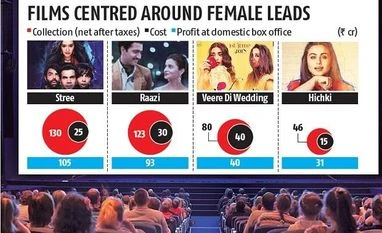A female spy, four childhood friends dealing with the challenges of adulthood, a teacher with Tourette Syndrome, and a middle-aged woman who gets a surprise in the form of a very late pregnancy. These are the stories that turned profits at the box office in 2018, and none of them featured a Khan, or any other male A-lister. 2018 was the year of the script and the not any one star.
2018 was also the year of diversity as genres as varied as comedy, thriller, romance, family drama, and horror found critical and commercial success. “Today, a consumer has access to so much diverse content that, rightly so, they are not willing to be taken for granted. In the process they have developed a broader ‘taste palate’ — akin to when the pizza got accepted along with desi khana,” says Vijay Singh, chief executive officer, Fox Star Studios (FSS). FSS was involved with two of the year’s most profitable films – Sanju and Baaghi 2.
While 2018 was the year of diversity and content-driven strategies, it was also a year of reckoning for the superstars of the industry. It was a rare year when all three Khans – Shah Rukh, Aamir, and Salman had a release each — failed to deliver. The performance of their films at the box office reflected the dwindling magnetism of the star when it came to getting people to the theatres, say experts.
“Indeed it has been (a year of reckoning for the industry). Even films with stars that succeeded have worked because these were strong scripts and the stars have shone playing strong characters, whether it’s the success of Ranbir (Kapoor) in Sanju or Ranveer (Singh) in Padmaavat,” says Ajit Andhare, chief operating officer (CEO), Viacom18 Motion Pictures (VMP).
VMP was one of the producers of Padmaavat. Another film with an A-list actor which did well at the box office was Pad Man starring Akshay Kumar, and a lot of its success is attributed to the script and concept.
“Whilst great content will always see a longer run at the box office, we cannot discard the pull of star power, which certainly aids in getting an opening on a Friday. However, after that it is all about the power of the script and content,” adds Singh.
Thugs of Hindostan, starring Aamir Khan and Amitabh Bachchan, earned a record, setting Rs 50 crore on the first day. However, as audiences unequivocally rejected the film, it’s lifetime collection failed to cross even Rs 150 crore.
Apart from meeting the changing tastes of the audiences, the industry continued to face issues with taxation. “Movies now involve the process where the transfer of rights for a movie from producer to distributor takes place at 12 per cent goods and services tax (GST). Film production involves producers paying a GST of 18 per cent, so there is a 6 per cent burden that every film carries right from the first day,” says Apoorva Mehta, CEO, Dharma Productions.
The government relaxed taxation on cinema tickets recently, but not on the production side. For tickets below Rs 100, the tax has been reduced from 18 per cent to 12 per cent, while for those above Rs 100, it has been reduced from 28 per cent to 18 per cent. “The recent action taken by the government to reduce GST on cinema tickets was a step in the right direction. However, the challenge of local taxes not subsumed into GST remains,” says Singh.
Going into 2019, Bollywood is already trying to remain topical and relevant with the release of films like Thackeray, Uri, and The Accidental Prime Minister in the time leading to the general elections. “You are already seeing elections being tapped creatively as topical in few films that are releasing in January. For instance, The Accidental Prime Minister is promoting itself on that platform,” says Andhare.
Mehta, however, warns it may not mean good business at the box office. “If we look at the movies released in 2014, 2 States was one of the few movies that performed well in that tenure. To that effect, the Indian film industry takes into consideration general elections in the country,” says Mehta.
Unlock 30+ premium stories daily hand-picked by our editors, across devices on browser and app.
Pick your 5 favourite companies, get a daily email with all news updates on them.
Full access to our intuitive epaper - clip, save, share articles from any device; newspaper archives from 2006.
Preferential invites to Business Standard events.
Curated newsletters on markets, personal finance, policy & politics, start-ups, technology, and more.
)